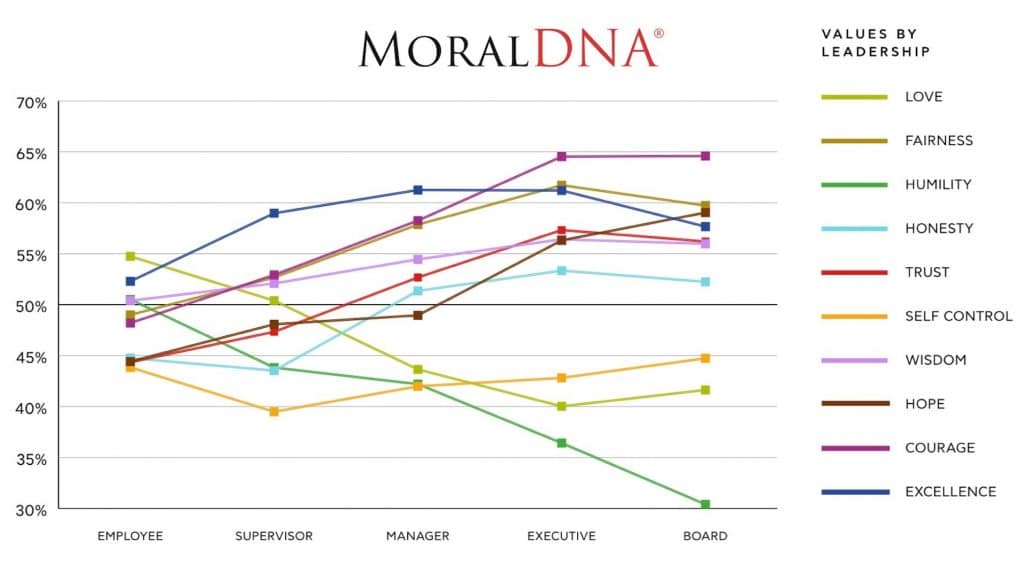Virtual Event

In his next Integrity@Work blog for Thinkers50, Roger Steare explores how power corrupts good people and describes the moral vices that lead to psychopathic behaviours and toxic cultures at work.
I love Game of Thrones. As well as the History of Western Philosophy, I also read Medieval History as an undergraduate and aside from the fantastical dragons and white walkers, I admire how Game of Thrones really captures the essence of power and corruption in a feudal society. The threat of violence leading to injury or death is ever present. Kings, queens and nobles vie for the “moral” right to sit on the Iron Throne in Westeros. But with a few exceptions, most of the royals and aristocrats are narcissistic, Machiavellian and psychopathic. These moral vices, or malevolent personality traits, are called the Dark Triad by psychologists. And research, including my own at MoralDNA, suggests a strong correlation between these traits and those with power in the corporation.
The corporation is a feudal construct. Leaders are not elected by employees, they are appointed by those who get power from wealth. In terms of political science, the corporation is a feudal plutocracy and rather like the kingdoms in Game of Thrones, power ultimately comes from money.
Winston Churchill famously wrote that:
“Many forms of Government have been tried and will be tried in this world of sin and woe. No one pretends that democracy is perfect or all-wise. Indeed, it has been said that democracy is the worst form of Government except all those other forms that have been tried from time to time.”
But if democracy is the “least, worst” form of government, plutocracy is widely regarded as the “worst, worst” form of government. In his autobiography, President Theodore Roosevelt wrote:
“Of all forms of tyranny the least attractive and the most vulgar is the tyranny of mere wealth, the tyranny of a plutocracy.”
Whilst many of us live in some form of democracy, most of us work in these feudal plutocracies where wealth creation for the few is the purpose we collude with. And it is my view that this feudalism corrupts many otherwise good people when they achieve power in the corporation.
Returning to the Dark Triad of moral vices, let’s explore them one by one and weigh up the evidence for the influence they have over both the individual misleader and the organisation they rule.
Narcissism is defined by psychologists as “selfishness, involving a sense of entitlement, a lack of empathy, and a need for admiration.”
It is clear, for example, that the principle cause of excessive executive pay is not greed, it’s a symptom of narcissism. Again, psychologists have determined that our happiness does not increase as we earn significantly more than the average wage in our society. But if we are narcissistic, we need to be constantly reassured that we are highly valued with a bigger pay check than our peers.
Our own MoralDNA research assesses narcissism as a low score in Humility and as you can see from Graph 1, executives and board members score lower on Humility than all other virtues; and significantly lower than less senior managers, supervisors and employees.

Graph 1
The Machiavellian trait is defined as “a personality trait which sees a person so focused on their own interests they will manipulate, deceive, and exploit others to achieve their goals.”
Machiavellianism might go some way to explaining not only why misleaders manipulate and deceive colleagues at work, it also probably explains why they manipulate and deceive customers, shareholders and communities. Accounting scandals, harmful products and miss-selling are all clear signs of Machiavellianism at work.
Finally, we have the psychopathic trait. At work this normally doesn’t show up as the serial killer, but what psychologists call the “functional psychopath”. Even so, this is normally regarded as the most dangerous of the Dark Triad traits. Psychopaths “show low levels of empathy combined with high levels of impulsivity and thrill-seeking”. In Graph 1, we can see low scores both on Care (empathy) and Self-Control (impulsivity), with Care lowest for our Executive cohort. Diesel emissions, the toxicity of tobacco, alcohol and sugar can all be blamed on the corporate psychopath.
I believe that the combination of the Dark Triad traits, together with the power of corporations to influence every aspect of our lives, including our politics, is lethal to our civilization. I also believe that many senior executives don’t start out to be vicious but become willing victims of our morally corrupt corporate design. But unless we democratise the workplace and hold misleaders personally accountable for their actions, we’re screwed.
And for fellow Game of Thrones fans, the final Season 8 begins broadcasting in the US on April 14 and in the UK on April 15.

Roger Steare is Visiting Professor in the Practice of Organisational Ethics at Cass Business School in London. He also works as The Corporate Philosopher, advising organisations around the world on leadership, culture and ethics.
Twitter: @RogerSteare
LinkedIn: LinkedIn.com/in/RogerSteare

Thinkers50 Limited
The Studio
Highfield Lane
Wargrave RG10 8PZ
United Kingdom

Thinkers50 Limited
The Studio
Highfield Lane
Wargrave RG10 8PZ
United Kingdom

Thinkers50 Limited
The Studio
Highfield Lane
Wargrave RG10 8PZ
United Kingdom
| Cookie | Duration | Description |
|---|---|---|
| LANG | 9 hours | Linkedin set this cookie to set user's preferred language. |
| nsid | session | This cookie is set by the provider PayPal to enable the PayPal payment service in the website. |
| sp_landing | 1 day | The sp_landing is set by Spotify to implement audio content from Spotify on the website and also registers information on user interaction related to the audio content. |
| sp_t | 1 year | The sp_t cookie is set by Spotify to implement audio content from Spotify on the website and also registers information on user interaction related to the audio content. |
| tsrce | 3 days | PayPal sets this cookie to enable the PayPal payment service in the website. |
| x-pp-s | session | PayPal sets this cookie to process payments on the site. |
| __cf_bm | 30 minutes | This cookie, set by Cloudflare, is used to support Cloudflare Bot Management. |
| Cookie | Duration | Description |
|---|---|---|
| l7_az | 30 minutes | This cookie is necessary for the PayPal login-function on the website. |
| Cookie | Duration | Description |
|---|---|---|
| CONSENT | 2 years | YouTube sets this cookie via embedded youtube-videos and registers anonymous statistical data. |
| _ga | 2 years | The _ga cookie, installed by Google Analytics, calculates visitor, session and campaign data and also keeps track of site usage for the site's analytics report. The cookie stores information anonymously and assigns a randomly generated number to recognize unique visitors. |
| _gat_gtag_UA_10408481_1 | 1 minute | Set by Google to distinguish users. |
| _ga_ZP8HQ8RZXS | 2 years | This cookie is installed by Google Analytics. |
| _gid | 1 day | Installed by Google Analytics, _gid cookie stores information on how visitors use a website, while also creating an analytics report of the website's performance. Some of the data that are collected include the number of visitors, their source, and the pages they visit anonymously. |
| Cookie | Duration | Description |
|---|---|---|
| NID | 6 months | NID cookie, set by Google, is used for advertising purposes; to limit the number of times the user sees an ad, to mute unwanted ads, and to measure the effectiveness of ads. |
| test_cookie | 15 minutes | The test_cookie is set by doubleclick.net and is used to determine if the user's browser supports cookies. |
| VISITOR_INFO1_LIVE | 5 months 27 days | A cookie set by YouTube to measure bandwidth that determines whether the user gets the new or old player interface. |
| YSC | session | YSC cookie is set by Youtube and is used to track the views of embedded videos on Youtube pages. |
| yt-remote-connected-devices | never | YouTube sets this cookie to store the video preferences of the user using embedded YouTube video. |
| yt-remote-device-id | never | YouTube sets this cookie to store the video preferences of the user using embedded YouTube video. |
| yt.innertube::nextId | never | This cookie, set by YouTube, registers a unique ID to store data on what videos from YouTube the user has seen. |
| yt.innertube::requests | never | This cookie, set by YouTube, registers a unique ID to store data on what videos from YouTube the user has seen. |
| Cookie | Duration | Description |
|---|---|---|
| DEVICE_INFO | 5 months 27 days | No description |
| loglevel | never | No description available. |
| m | 2 years | No description available. |
Thinkers50 Limited has updated its Privacy Policy on 28 March 2024 with several amendments and additions to the previous version, to fully incorporate to the text information required by current applicable date protection regulation. Processing of the personal data of Thinkers50’s customers, potential customers and other stakeholders has not been changed essentially, but the texts have been clarified and amended to give more detailed information of the processing activities.